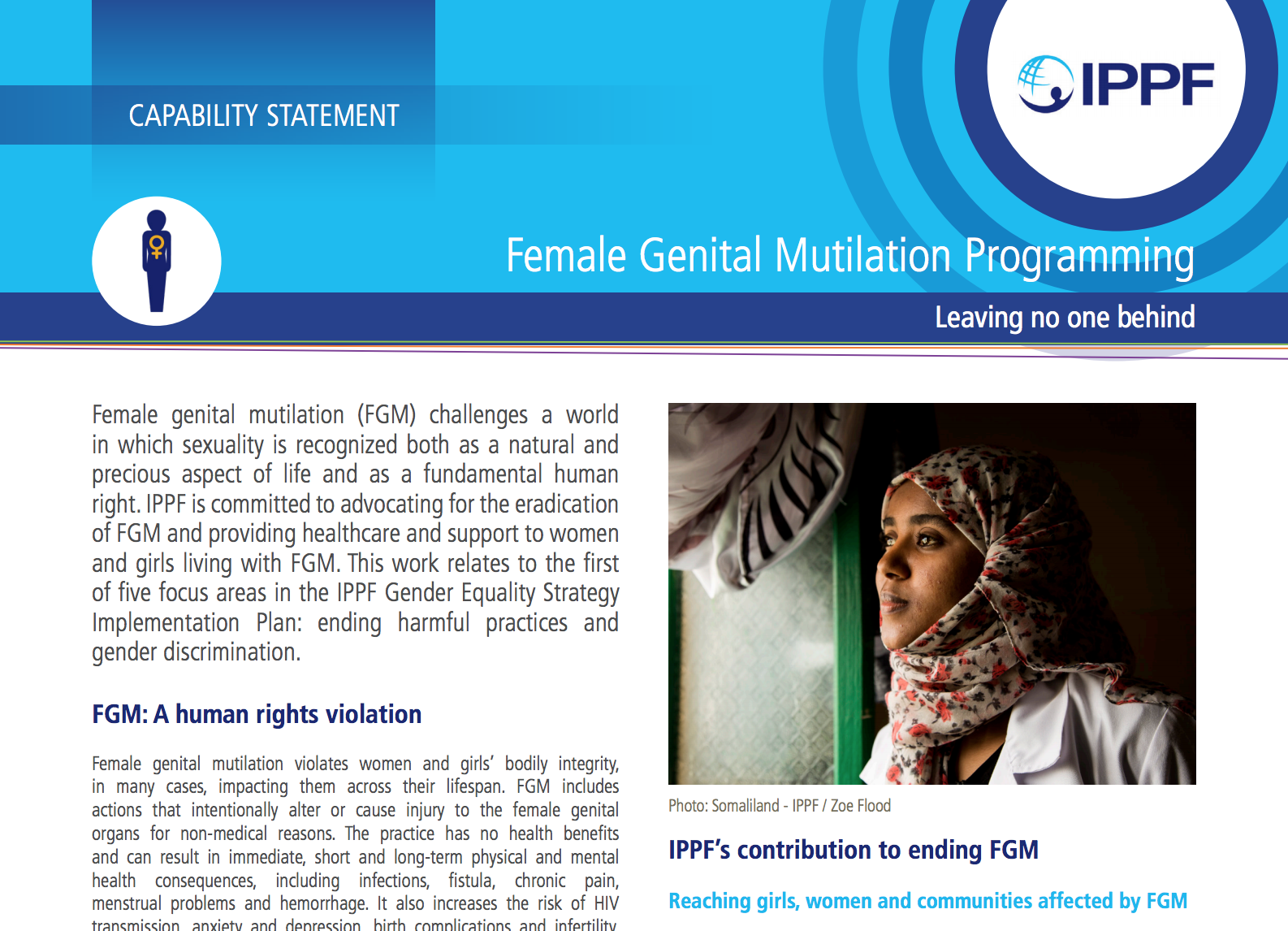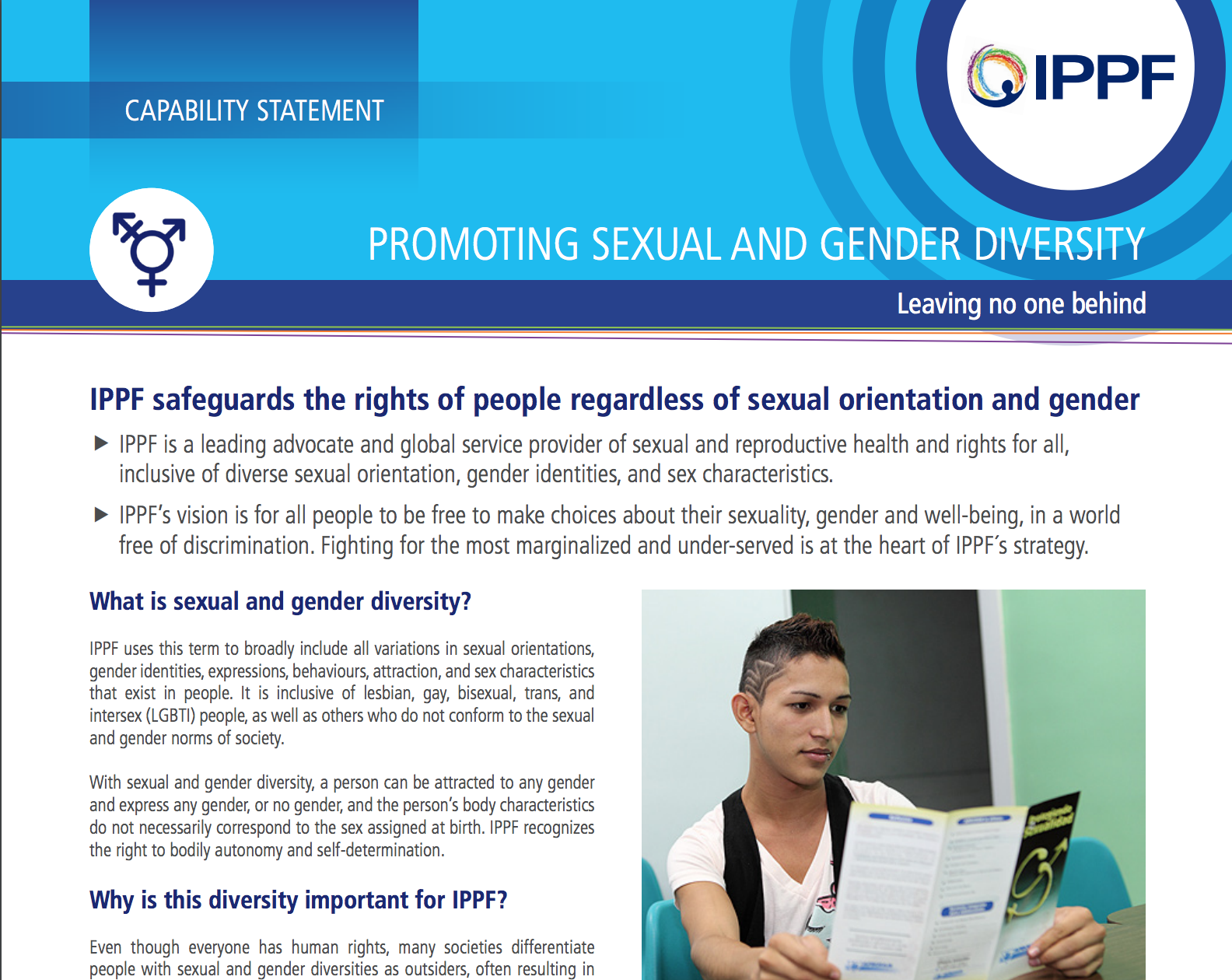Spotlight
A selection of resources from across the Federation

HIV Theory of Change
Our HIV Theory of Change is to clarify the goals and vision of IPPF’s HIV programme and to articulate the different pathways and strategies IPPF uses to contribute towards its HIV goals and vision.
Filter our resources by:


| 18 June 2020
Capability Statement: Female Genital Mutilation
Female genital mutilation violates women and girls’ bodily integrity, in many cases, impacting them across their lifespan. FGM includes actions that intentionally alter or cause injury to the female genital organs for non-medical reasons. The practice has no health benefits and can result in immediate, short and long-term physical and mental health consequences, including infections, fistula, chronic pain, menstrual problems and hemorrhage. It also increases the risk of HIV transmission, anxiety and depression, birth complications and infertility

| 18 June 2020
Capability Statement: Promoting Sexual & Gender Diversity
IPPF is committed to working in solidarity with organizations that address the negative sexual and gender norms, and promote and uphold the rights of sexual and gender diverse people at all levels of society. At the Nairobi Summit to mark 25 years since the landmark International Conference on Population and Development (ICPD) in November 2019, IPPF recognized that IPPF and many of its Member Associations are fighting discriminatory laws based on sexual orientation, and committed to supporting each other and engaging with partners to ensure at least six countries change these laws by 2025.

| 09 December 2019
Capability Statement: Youth in Humanitarian Action
Launched at the World Humanitarian Summit, the Compact for Young People in Humanitarian Action is a collective commitment of over 50 humanitarian actors to ensure that the priorities of young people are addressed, and that they are informed, consulted, and meaningfully engaged throughout all stages of humanitarian action. The ‘Inter-agency Guidelines for Working with and for Young People in Humanitarian Settings’ was developed to address the gap in humanitarian tools that tend to overlook young people, a specific but broad demographic with interlinked needs across multiple sectors.

| 18 June 2019
Capability Statement: LGBTIQ+ Inclusion in Humanitarian Settings
The vulnerabilities of marginalised people, including Lesbian, Gay, Bisexual, Transgender, Intersex and Queer (LGBTIQ+) persons, are often exacerbated in disasters, emergencies and crises. This is including their access to quality and non-discriminatory sexual and reproductive health (SRH) services and information. SRH is a human right and an essential component of the overall health and protection package in a humanitarian response. Providing comprehensive, high-quality SRH services in humanitarian settings requires a multisectoral and integrated approach to reach the LGBTIQ+ community. Though the LGBTIQ+ community is often more vulnerable, they also have strong capabilities to cope in the aftermath of disasters, and to leverage social networks in preparedness, relief and recovery phases for themselves and their communities, something that the humanitarian community should leverage based on the principles of ‘do no harm’ and ‘leaving no one behind’.

| 13 June 2019
Workplace Health Service Delivery - IPPF Capability Statement
Millions of workers across the world struggle to access sexual and reproductive health services. Reasons for this can range from a general lack of knowledge of health needs and rights, to insufficient time to find or access services due to working hours. IPPF is working with large employers to address these barriers, devising models that provide information and education to workers on their health and rights, and ensure access to quality sexual and reproductive health services that take into account the needs of the workers and the employers. It is estimated that IPPF reaches over 1 million workers annually through health services delivered via engagement in the workplace.















